US President Donald Trump hailed West Africa's rich natural resources as he hosted five of its leaders Wednesday. The United States is working tirelessly to forge new economic opportunities involving both the United States and many African nations," Trump said. Trump's administration is seeking to strengthen economic ties with the mineral-rich region as it simultaneously curbs foreign aid to Africa and hits nations with 10 percent import tariffs.
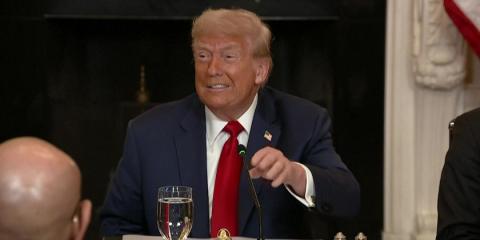
US President Donald Trump hailed West Africa's rich natural resources as he hosted five of its leaders Wednesday. The United States is working tirelessly to forge new economic opportunities involving both the United States and many African nations," Trump said. Trump's administration is seeking to strengthen economic ties with the mineral-rich region as it simultaneously curbs foreign aid to Africa and hits nations with 10 percent import tariffs.
Talks with the presidents of Senegal, Liberia, Guinea-Bissau, Mauritania and Gabon were expected to focus on commercial opportunities and security. All five of the countries invited enjoy rich natural resources, including manganese.
mitv
US President Donald Trump hailed West Africa's rich natural resources as he hosted five of its leaders Wednesday. The United States is working tirelessly to forge new economic opportunities involving both the United States and many African nations," Trump said. Trump's administration is seeking to strengthen economic ties with the mineral-rich region as it simultaneously curbs foreign aid to Africa and hits nations with 10 percent import tariffs.
Talks with the presidents of Senegal, Liberia, Guinea-Bissau, Mauritania and Gabon were expected to focus on commercial opportunities and security. All five of the countries invited enjoy rich natural resources, including manganese.
mitv

Leader of the State Administration Council Information Team Maj-Gen Zaw Min Tun, on July 8, clarified regarding the letter sent by the U.S. President Donald Trump to Myanmar Prime Minister and Chairman of State Administration Council, Senior General Min Aung Hlaing, concerning trade matters which has been the subject of media inquiries.
Leader of the State Administration Council Information Team Maj-Gen Zaw Min Tun, on July 8, clarified regarding the letter sent by the U.S. President Donald Trump to Myanmar Prime Minister and Chairman of State Administration Council, Senior General Min Aung Hlaing, concerning trade matters which has been the subject of media inquiries.
The Information Team Leader explained that the letter expressed an interest in engaging in trade with Myanmar and acknowledged the presence of significant trade-related capital. In summary, the United States intends to impose a 40% tariff on imports from Myanmar, while also requesting that Myanmar reduce tariffs on goods imported from the U.S. Additionally, the letter mentioned the possibility for Myanmar to make investments in the United States.
It also highlighted the potential for negotiations regarding tariff rates between the two countries. The letter has been well received. In terms of trade volume, during the 2023–2024 fiscal year, total trade between Myanmar and the United States amounted to approximately 701.9 million USD, and in the 2024–2025 fiscal year, it reached over 588.3 million USD.
The official stance of the Myanmar government regarding this letter is the constructive engagement and communication will be pursued. These negotiations are expected to yield mutually beneficial outcomes for both countries.
mitv
Leader of the State Administration Council Information Team Maj-Gen Zaw Min Tun, on July 8, clarified regarding the letter sent by the U.S. President Donald Trump to Myanmar Prime Minister and Chairman of State Administration Council, Senior General Min Aung Hlaing, concerning trade matters which has been the subject of media inquiries.
The Information Team Leader explained that the letter expressed an interest in engaging in trade with Myanmar and acknowledged the presence of significant trade-related capital. In summary, the United States intends to impose a 40% tariff on imports from Myanmar, while also requesting that Myanmar reduce tariffs on goods imported from the U.S. Additionally, the letter mentioned the possibility for Myanmar to make investments in the United States.
It also highlighted the potential for negotiations regarding tariff rates between the two countries. The letter has been well received. In terms of trade volume, during the 2023–2024 fiscal year, total trade between Myanmar and the United States amounted to approximately 701.9 million USD, and in the 2024–2025 fiscal year, it reached over 588.3 million USD.
The official stance of the Myanmar government regarding this letter is the constructive engagement and communication will be pursued. These negotiations are expected to yield mutually beneficial outcomes for both countries.
mitv
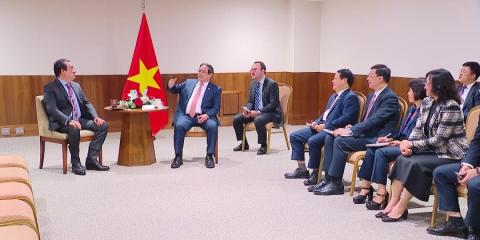
Vietnamese Prime Minister Pham Minh Chinh met with executives of major Brazilian corporations to advance cooperation across multiple sectors in Rio de Janeiro city.
Vietnamese Prime Minister Pham Minh Chinh met with executives of major Brazilian corporations to advance cooperation across multiple sectors in Rio de Janeiro city.
He met with executives of Vale, a multinational group specializing in metals, mining, and logistics. At these meetings, the Prime Minister highlighted Vietnam’s current landscape, key development priorities, and its favourable investment and business environment. He urged Brazilian corporations, business associations, and federations to support the early conclusion of these deals to facilitate business cooperation.
mitv
Vietnamese Prime Minister Pham Minh Chinh met with executives of major Brazilian corporations to advance cooperation across multiple sectors in Rio de Janeiro city.
He met with executives of Vale, a multinational group specializing in metals, mining, and logistics. At these meetings, the Prime Minister highlighted Vietnam’s current landscape, key development priorities, and its favourable investment and business environment. He urged Brazilian corporations, business associations, and federations to support the early conclusion of these deals to facilitate business cooperation.
mitv

EU chief Ursula von der Leyen and US President Donald Trump had a "good exchange" about trade as Brussels seeks a deal to avoid steep tariffs before the July 9 deadline. The European Commission spokesman said Monday that both leaders spoke by phone on Sunday, adding that "work is ongoing" at all levels to reach an agreement.
mitv
EU chief Ursula von der Leyen and US President Donald Trump had a "good exchange" about trade as Brussels seeks a deal to avoid steep tariffs before the July 9 deadline. The European Commission spokesman said Monday that both leaders spoke by phone on Sunday, adding that "work is ongoing" at all levels to reach an agreement.
mitv
EU chief Ursula von der Leyen and US President Donald Trump had a "good exchange" about trade as Brussels seeks a deal to avoid steep tariffs before the July 9 deadline. The European Commission spokesman said Monday that both leaders spoke by phone on Sunday, adding that "work is ongoing" at all levels to reach an agreement.
mitv
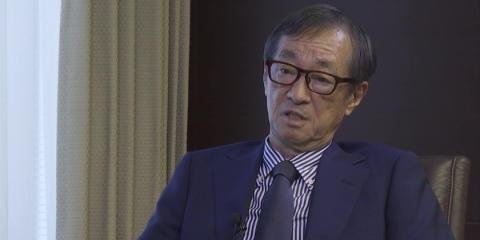
Nippon Steel completed its acquisition of US Steel last month, after a year-and-a-half of negotiations. The Japanese company made the iconic American firm a wholly owned subsidiary after lengthy negotiations to gain approval from the Trump administration. Nippon Steel's Chairman and CEO Hashimoto said that the global trade system had undergone a major change where Japanese companies can play a part in the revival of US manufacturing.
mitv
Nippon Steel completed its acquisition of US Steel last month, after a year-and-a-half of negotiations. The Japanese company made the iconic American firm a wholly owned subsidiary after lengthy negotiations to gain approval from the Trump administration. Nippon Steel's Chairman and CEO Hashimoto said that the global trade system had undergone a major change where Japanese companies can play a part in the revival of US manufacturing.
mitv
Nippon Steel completed its acquisition of US Steel last month, after a year-and-a-half of negotiations. The Japanese company made the iconic American firm a wholly owned subsidiary after lengthy negotiations to gain approval from the Trump administration. Nippon Steel's Chairman and CEO Hashimoto said that the global trade system had undergone a major change where Japanese companies can play a part in the revival of US manufacturing.
mitv
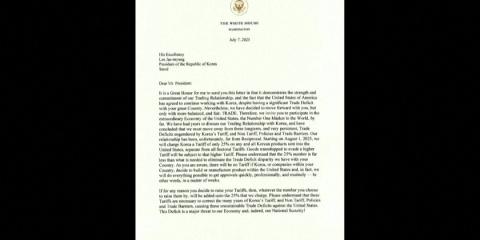
U.S. President Donald Trump said Monday on social media that 25-percent tariffs will be imposed on imports from Japan and the Republic of Korea, respectively, beginning Aug. 1.
U.S. President Donald Trump said Monday on social media that 25-percent tariffs will be imposed on imports from Japan and the Republic of Korea, respectively, beginning Aug. 1.
In his letters addressed to the leaders of the two countries, Trump said the new tariffs will be separate from all other sectoral tariffs. Later on, he announced that similar letters were sent to the leaders of 12 other countries, namely Malaysia, Kazakhstan, South Africa, Myanmar, Laos, Tunisia, Indonesia, Bangladesh, Serbia, Bosnia and Herzegovina, Cambodia, and Thailand, informing them that tariffs ranging 25 percent to 40 percent will be charged starting next month.
mitv
U.S. President Donald Trump said Monday on social media that 25-percent tariffs will be imposed on imports from Japan and the Republic of Korea, respectively, beginning Aug. 1.
In his letters addressed to the leaders of the two countries, Trump said the new tariffs will be separate from all other sectoral tariffs. Later on, he announced that similar letters were sent to the leaders of 12 other countries, namely Malaysia, Kazakhstan, South Africa, Myanmar, Laos, Tunisia, Indonesia, Bangladesh, Serbia, Bosnia and Herzegovina, Cambodia, and Thailand, informing them that tariffs ranging 25 percent to 40 percent will be charged starting next month.
mitv
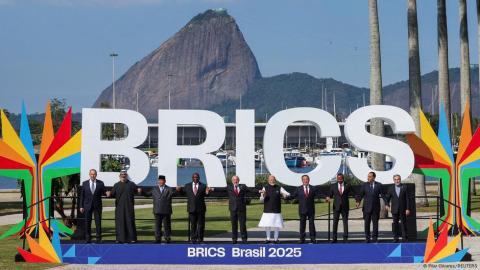
(DW News, July 7, 2025)
Leaders of the growing BRICS group of developing nations met in Rio de Janeiro on Sunday, reaffirming the bloc's commitment to multilateral diplomacy. In his opening remarks, Brazilian President Luiz Inacio Lula da Silva said, "We are witnessing the unparalleled collapse of multilateralism." "If international governance does not reflect the new multipolar reality of the 21st century, it is up to BRICS to help bring it up to date," he said.
(DW News, July 7, 2025)
Leaders of the growing BRICS group of developing nations met in Rio de Janeiro on Sunday, reaffirming the bloc's commitment to multilateral diplomacy. In his opening remarks, Brazilian President Luiz Inacio Lula da Silva said, "We are witnessing the unparalleled collapse of multilateralism." "If international governance does not reflect the new multipolar reality of the 21st century, it is up to BRICS to help bring it up to date," he said.
He also criticized the NATO military alliance, accusing it of fueling a global arms race after it set a defense spending target of 5% of GDP late last month. BRICS countries also condemned US President Donald Trump’s "indiscriminate" tariff policy. They voiced "serious concerns about the rise of unilateral tariff and non-tariff measures which distort trade and are inconsistent with WTO rules," saying such measures were “affecting prospects for global economic development.”
Trump has said that tariff of up to 50% could be imposed on August 1 if countries do not reach deals with Washington by that time. The US president on Sunday also lashed out at BRICS, vowing to impose an extra 10% tariff on the grouping. "Any Country aligning themselves with the Anti-American policies of BRICS, will be charged an ADDITIONAL 10% Tariff. There will be no exceptions to this policy," Trump wrote in a post on his Truth Social social network.
Trump did not clarify or expand on the "Anti-American policies" reference in his post. The bloc, originally formed by Brazil, Russia, India, China, and South Africa, has grown in size with Egypt, Ethiopia, Iran, Saudi Arabia, the United Arab Emirates and Indonesia joining as members last year. It accounts for about half the world's population.
For the first time since becoming China's leader in 2012, President Xi Jinping has opted out of attending the BRICS summit. Xi chose to send his Premier Li Qiang to represent Beijing. China's Foreign Ministry did not say why Xi is skipping the meeting in Rio de Janeiro.
Russian President Vladimir Putin is also staying away, but he made an appearance via videoconference. Putin is wanted by the International Criminal Court for his role in the full-scale invasion of Ukraine. Brazil, as a member of the court, would be obliged to arrest Putin if he entered the country.
In televised remarks, Putin noted that "everything indicates that the model of liberal globalization is becoming obsolete." "The center of business activity is shifting towards the emerging markets," he added. Putin also urged member countries to step up cooperation in various areas including natural resources, logistics, trade, and finance.
Indian Prime Minister Narendra Modi, meanwhile, said BRICS must lead the Global South in an increasingly multipolar world.
Ref - DW News
(DW News, July 7, 2025)
Leaders of the growing BRICS group of developing nations met in Rio de Janeiro on Sunday, reaffirming the bloc's commitment to multilateral diplomacy. In his opening remarks, Brazilian President Luiz Inacio Lula da Silva said, "We are witnessing the unparalleled collapse of multilateralism." "If international governance does not reflect the new multipolar reality of the 21st century, it is up to BRICS to help bring it up to date," he said.
He also criticized the NATO military alliance, accusing it of fueling a global arms race after it set a defense spending target of 5% of GDP late last month. BRICS countries also condemned US President Donald Trump’s "indiscriminate" tariff policy. They voiced "serious concerns about the rise of unilateral tariff and non-tariff measures which distort trade and are inconsistent with WTO rules," saying such measures were “affecting prospects for global economic development.”
Trump has said that tariff of up to 50% could be imposed on August 1 if countries do not reach deals with Washington by that time. The US president on Sunday also lashed out at BRICS, vowing to impose an extra 10% tariff on the grouping. "Any Country aligning themselves with the Anti-American policies of BRICS, will be charged an ADDITIONAL 10% Tariff. There will be no exceptions to this policy," Trump wrote in a post on his Truth Social social network.
Trump did not clarify or expand on the "Anti-American policies" reference in his post. The bloc, originally formed by Brazil, Russia, India, China, and South Africa, has grown in size with Egypt, Ethiopia, Iran, Saudi Arabia, the United Arab Emirates and Indonesia joining as members last year. It accounts for about half the world's population.
For the first time since becoming China's leader in 2012, President Xi Jinping has opted out of attending the BRICS summit. Xi chose to send his Premier Li Qiang to represent Beijing. China's Foreign Ministry did not say why Xi is skipping the meeting in Rio de Janeiro.
Russian President Vladimir Putin is also staying away, but he made an appearance via videoconference. Putin is wanted by the International Criminal Court for his role in the full-scale invasion of Ukraine. Brazil, as a member of the court, would be obliged to arrest Putin if he entered the country.
In televised remarks, Putin noted that "everything indicates that the model of liberal globalization is becoming obsolete." "The center of business activity is shifting towards the emerging markets," he added. Putin also urged member countries to step up cooperation in various areas including natural resources, logistics, trade, and finance.
Indian Prime Minister Narendra Modi, meanwhile, said BRICS must lead the Global South in an increasingly multipolar world.
Ref - DW News
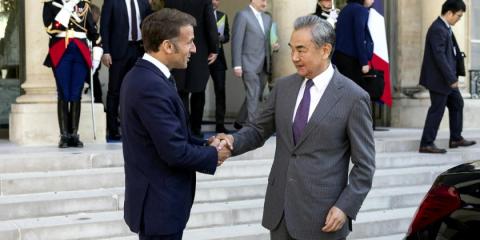
French President Emmanuel Macron met with Chinese Foreign Minister Wang Yi on Friday, pledging to jointly promote multilateralism and strengthen coordination against hegemonic conflicts and bloc confrontation.
French President Emmanuel Macron met with Chinese Foreign Minister Wang Yi on Friday, pledging to jointly promote multilateralism and strengthen coordination against hegemonic conflicts and bloc confrontation.
The French side looks forward to strengthening policy coordination with China on international economic, financial, and global governance issues, jointly addressing global challenges, injecting more vitality into multilateralism, and preventing the world from falling into hegemonic conflicts and bloc confrontations, Macron said. He expressed hope to visit China again at an appropriate time.
Wang said China is willing to deepen mutually beneficial cooperation with France and hopes that the French side will provide a more favorable and fair environment for Chinese enterprises to invest and operate in France.
mitv
French President Emmanuel Macron met with Chinese Foreign Minister Wang Yi on Friday, pledging to jointly promote multilateralism and strengthen coordination against hegemonic conflicts and bloc confrontation.
The French side looks forward to strengthening policy coordination with China on international economic, financial, and global governance issues, jointly addressing global challenges, injecting more vitality into multilateralism, and preventing the world from falling into hegemonic conflicts and bloc confrontations, Macron said. He expressed hope to visit China again at an appropriate time.
Wang said China is willing to deepen mutually beneficial cooperation with France and hopes that the French side will provide a more favorable and fair environment for Chinese enterprises to invest and operate in France.
mitv
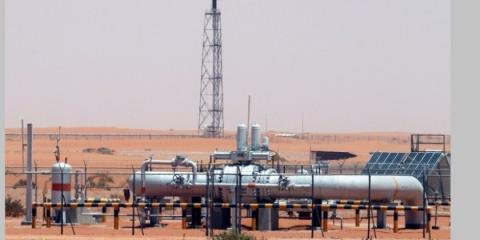
The world's major oil producing group OPEC Plus said it will further increase crude oil production in August. Eight OPEC Plus members, including Saudi Arabia and Russia, agreed during an online meeting on Saturday to raise output by 548,000 barrels per day next month.
The world's major oil producing group OPEC Plus said it will further increase crude oil production in August. Eight OPEC Plus members, including Saudi Arabia and Russia, agreed during an online meeting on Saturday to raise output by 548,000 barrels per day next month.
In April, the eight countries began scaling back their voluntary output reductions of 2.2 million barrels per day. Since then, they have been gradually expanding crude oil production. The further increase in August is a jump from monthly increases of 411,000 barrels per day that OPEC Plus had approved for May, June and July. In June, the benchmark WTI futures index rose to the mid-78 dollars per barrel range following US attacks on Iran.
The index fell after a ceasefire agreement between Israel and Iran was announced.Recently, the WTI has stabilized at around 67 dollars per barrel. Analysts say the output increase planned by OPEC Plus could drive down crude oil prices.
mitv
The world's major oil producing group OPEC Plus said it will further increase crude oil production in August. Eight OPEC Plus members, including Saudi Arabia and Russia, agreed during an online meeting on Saturday to raise output by 548,000 barrels per day next month.
In April, the eight countries began scaling back their voluntary output reductions of 2.2 million barrels per day. Since then, they have been gradually expanding crude oil production. The further increase in August is a jump from monthly increases of 411,000 barrels per day that OPEC Plus had approved for May, June and July. In June, the benchmark WTI futures index rose to the mid-78 dollars per barrel range following US attacks on Iran.
The index fell after a ceasefire agreement between Israel and Iran was announced.Recently, the WTI has stabilized at around 67 dollars per barrel. Analysts say the output increase planned by OPEC Plus could drive down crude oil prices.
mitv
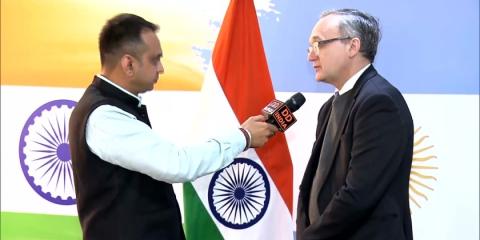
Indian Prime Minister Narendra Modi's visited to Argentina to gain strategic and economic significance. Gustavo Idigoras, Executive Director of the India-Argentina Business Council (IABC), revealed that India and Argentina aim to boost bilateral trade from $5 billion to $8 billion, with a target of $14 billion by 2040. He also emphasized Argentina’s keen interest in signing a Free Trade Agreement with India.
mitv
Indian Prime Minister Narendra Modi's visited to Argentina to gain strategic and economic significance. Gustavo Idigoras, Executive Director of the India-Argentina Business Council (IABC), revealed that India and Argentina aim to boost bilateral trade from $5 billion to $8 billion, with a target of $14 billion by 2040. He also emphasized Argentina’s keen interest in signing a Free Trade Agreement with India.
mitv
Indian Prime Minister Narendra Modi's visited to Argentina to gain strategic and economic significance. Gustavo Idigoras, Executive Director of the India-Argentina Business Council (IABC), revealed that India and Argentina aim to boost bilateral trade from $5 billion to $8 billion, with a target of $14 billion by 2040. He also emphasized Argentina’s keen interest in signing a Free Trade Agreement with India.
mitv

